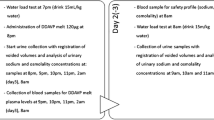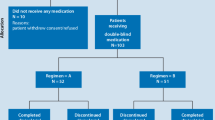Abstract
Purpose
Desmopressin is used widely to treat nocturnal polyuria (NP), but there is concern of hyponatremia especially in elderly patients. This study aimed to evaluate the safety and efficacy of long-term desmopressin treatment in elderly patients with NP.
Methods
Patients who were ≥65 years old with NP were analyzed. All patients were started on 0.1 mg desmopressin, and the dose was escalated to 0.2 mg depending on patient symptoms. All patients were educated the mechanism of desmopressin. The voiding diary and serum sodium levels were evaluated at baseline, 3–7 days after starting treatment and every 3–6 months. Safety was evaluated by hyponatremia, hyponatremic symptoms and other adverse drug events. The mean changes in number of nocturia and nocturnal urine volume (NUV) were evaluated for efficacy.
Results
A total of 68 patients were included. The mean age was 72.6 (66–85) years. The mean night-time frequency was 3.0 ± 1.8 day, and the mean serum sodium level was 141.2 ± 2.1 mEq/L at baseline. The mean follow-up period was 27.9 months. The mean decrease in serum sodium level was 1.3 ± 3.4 mEq/L at the last follow-up (p = 0.003). Hyponatremia incidence was 4.4 %, and all patients recovered by stopping medication. Severe adverse events were not observed. The mean night-time frequency had decreased by 2.1, and the NUV had decreased by 374.2 ± 261.3 mL at the last follow-up (p < 0.001).
Conclusions
Desmopressin at doses below 0.2 mg is safe and effective in elderly patients with NP if patients are well informed and are closely followed up.

Similar content being viewed by others
References
Asplund R (2006) Hip fractures, nocturia, and nocturnal polyuria in the elderly. Arch Gerontol Geriatr 43:319–326
Lundgren R (2004) Nocturia: a new perspective on an old symptom. Scand J Urol Nephrol 38:112–116
Matthiesen TB, Rittig S, Norgaard JP, Pedersen EB, Djurhuus JC (1996) Nocturnal polyuria and natriuresis in male patients with nocturia and lower urinary tract symptoms. J Urol 156:1292–1299
Chang SC, Lin AT, Chen KK, Chang LS (2006) Multifactorial nature of male nocturia. Urology 67:541–544
Kirkland JL, Lye M, Levy DW, Banerjee AK (1983) Patterns of urine flow and electrolyte excretion in healthy elderly people. Br Med J 287:1665–1667
Asplund R, Aberg H (1996) Nocturnal micturition, sleep and well-being in women of ages 40–64 years. Maturitas 24:73–81
Mattiasson A, Abrams P, Van Kerrebroeck P, Walter S, Weiss J (2002) Efficacy of desmopressin in the treatment of nocturia: a double-blind placebo-controlled study in men. BJU Int 89:855–862
Cvetkovic RS, Plosker GL (2005) Desmopressin: in adults with nocturia. Drugs 65:99–107
Bosma R, Wynia K, Havlikova E, De Keyser J, Middel B (2005) Efficacy of desmopressin in patients with multiple sclerosis suffering from bladder dysfunction: a meta-analysis. Acta Neurol Scand 112:1–5
Appell RA, Sand PK (2008) Nocturia: etiology, diagnosis, and treatment. Neurourol Urodyn 27:34–39
Fu FG, Lavery HJ, Wu DL (2011) Reducing nocturia in the elderly: a randomized placebo-controlled trial of staggered furosemide and desmopressin. Neurourol Urodyn 30:312–316
Kessler TM, Madersbacher H (2004) Urodynamic phenomena in the aging bladder. Urol A 43:542–546
Van Kerrebroeck P, Abrams P, Chaikin D, Donovan J, Fonda D, Jackson S, Jennum P, Johnson T, Lose GR, Mattiasson A, Robertson GL, Weiss J, International Continence S (2002) The standardization of terminology in nocturia: report from the standardization subcommittee of the International Continence Society. BJU Int 90(Suppl 3):11–15
Weiss JP, Blaivas JG, Stember DS, Brooks MM (1998) Nocturia in adults: etiology and classification. Neurourol Urodyn 17:467–472
Robertson GL, Norgaard JP (2002) Renal regulation of urine volume: potential implications for nocturia. BJU Int 90(Suppl 3):7–10
Miller M (2000) Nocturnal polyuria in older people: pathophysiology and clinical implications. J Am Geriatr Soc 48:1321–1329
Norgaard JP, Rittig S, Djurhuus JC (1989) Nocturnal enuresis: an approach to treatment based on pathogenesis. J Pediatr 114:705–710
Norgaard JP, Jonler M, Rittig S, Djurhuus JC (1995) A pharmacodynamic study of desmopressin in patients with nocturnal enuresis. J Urol 153:1984–1986
Donahue JL, Lowenthal DT (1997) Nocturnal polyuria in the elderly person. Am J Med Sci 314:232–238
Schulman SL, Stokes A, Salzman PM (2001) The efficacy and safety of oral desmopressin in children with primary nocturnal enuresis. J Urol 166:2427–2431
Hvistendahl GM, Frøkiær J, Nielsen S, Djurhuus JC (2003) The effect of DDAVP on the circadian rhythm in urine excretion: a study in elderly and young volunteers. In: ICS 33rd annual meeting. http://www.ics.org/Abstracts/Publish/41/000181.pdf
Asplund R (2007) Pharmacotherapy for nocturia in the elderly patient. Drugs Aging 24:325–343
Lose G, Mattiasson A, Walter S, Lalos O, van Kerrebroeck P, Abrams P, Freeman R (2004) Clinical experiences with desmopressin for long-term treatment of nocturia. J Urol 172:1021–1025
Moon DG, Jin MH, Lee JG, Kim JJ, Kim MG, Cha DR (2004) Antidiuretic hormone in elderly male patients with severe nocturia: a circadian study. BJU Int 94:571–575
Vaughan CP, Endeshaw Y, Nagamia Z, Ouslander JG, Johnson TM (2009) A multicomponent behavioural and drug intervention for nocturia in elderly men: rationale and pilot results. BJU Int 104:69–74
Rezakhaniha B, Arianpour N, Siroosbakhat S (2011) Efficacy of desmopressin in treatment of nocturia in elderly men. J Res Med Sci 16:516–523
Juul KV, Klein BM, Norgaard JP (2013) Long-term durability of the response to desmopressin in female and male nocturia patients. Neurourol Urodyn 32:363–370
Weiss JP, Zinner NR, Klein BM, Norgaard JP (2012) Desmopressin orally disintegrating tablet effectively reduces nocturia: results of a randomized, double-blind, placebo-controlled trial. Neurourol Urodyn 31:441–447
Kuo HC (2002) Efficacy of desmopressin in treatment of refractory nocturia in patients older than 65 years. Urology 59:485–489
Weatherall M (2004) The risk of hyponatremia in older adults using desmopressin for nocturia: a systematic review and meta-analysis. Neurourol Urodyn 23:302–305
Conflict of interest
Miho Song, Bum Sik Hong, Ji-Youn Chun, Ji-Yeon Han and Myung-Soo Choo have no conflict of interest.
Author information
Authors and Affiliations
Corresponding author
Additional information
Miho Song and Bum Sik Hong have contributed equally to this work.
Rights and permissions
About this article
Cite this article
Song, M., Hong, B.S., Chun, JY. et al. Safety and efficacy of desmopressin for the treatment of nocturia in elderly patients: a cohort study. Int Urol Nephrol 46, 1495–1499 (2014). https://doi.org/10.1007/s11255-014-0679-0
Received:
Accepted:
Published:
Issue Date:
DOI: https://doi.org/10.1007/s11255-014-0679-0




